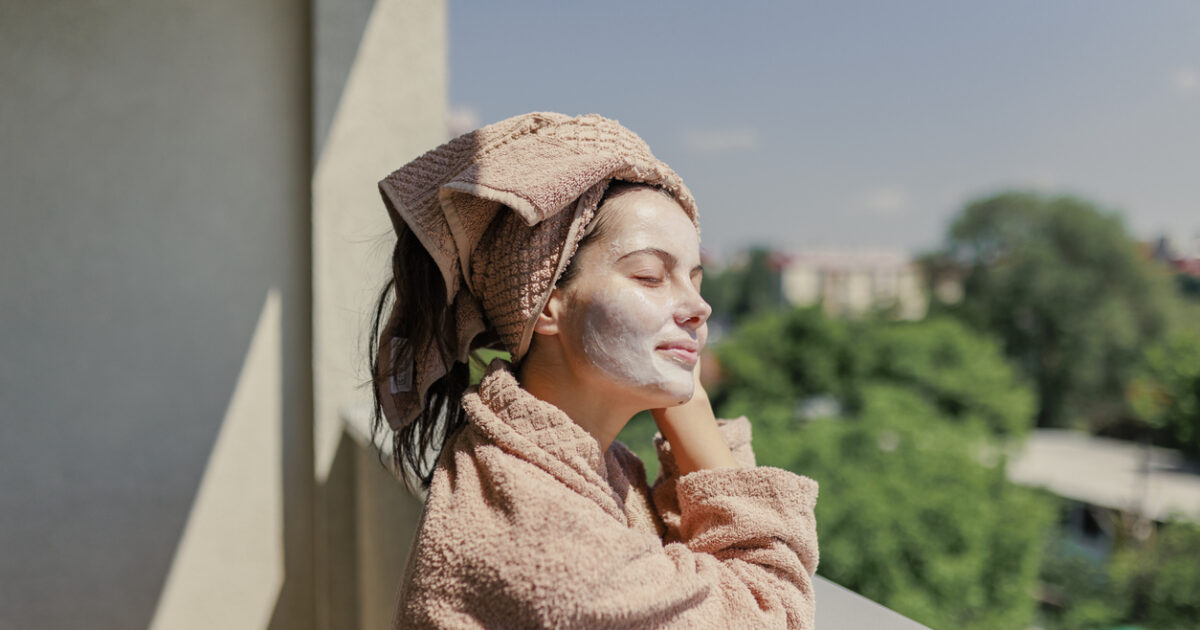In spite of the myth prevailing, exposure to helium does not help address the acne. Studies show that 50% of patients see the deterioration of symptoms in summer. While it really has the ability to dry the pimples first, over time it aggravates skin disease, as UVB rays cause inflammation and damage to the skin barrier resulting in more severe symptoms.
The combination of solar radiation with other summer conditions and stresses the skin leads to both clogged pores and unwanted spots. The sun, high temperatures, high humidity levels (in some areas), increased sweating and inappropriate sun protection are a very dangerous mixture for those with a tendency to acne. However, with the right skin care routine and some lifestyle changes, pure skin is not a dream.
‘The ultraviolet radiation UVA and UVB affect acne in a different way. UVB can increase the proliferation of keratinocytes and sebum production, while UVA reduces inflammation for it and is used to treat acne (as well as visible light). They also limit colonization from P. Acnes bacteria, without increasing sebum production. The same is true of infrared light, ”explains Dr. Dr. Christos Stamou.
“Excessive exposure to the sun can also aggravate the hyperloding that occurs due to acne, prolonging the stay of the dark signs and red spots that remain after the lesions are retreat,” he adds.
At the same time, the heat and humidity in the summer are factors for increasing sebum production. The coexistence of sweat and greasy creates the perfect conditions of trapping the pollutants and dead skin cells, blocking the pores, the main cause of acne outbreaks.
Part of the problem is also the application inappropriate sunscreen on acneic skin. It is understood that their daily use is non -negotiable, even if the skin is exposed only for short times in the sun. But their composition can cause the symptoms to deteriorate. Sickly, heavy and eating (clogging pores) sunscreen can create an environment that traps heat and oiliness in the skin and lead to acne growth.
Frequent deterioration factor in summer is also the dehydration (exposure to the sun, air conditioners and inadequate water intake) no matter how absurd it sounds. But when the skin has no humidity it tries to compensate for the lack of sebum to protect it.
Although both sexes can see worsening their symptoms, men are more at risk in summer, as a significant proportion of them do professions that require more intense physical activity and sun exposure, which in the warm and humid climate of our area could cause worsening the disease.
Protection
Proper, daily sun protection in people with acne or skin prone to it protects, as long as they are friendly to their needs. The wide spectrum sunscreen with natural inhibitors such as the zinc, They protect against solar radiation and negative effects, moisturize the skin, enhance the function of the skin barrier and reduce transdermal water loss. They can also help regulate sebum to protect against pollution and over -clarification. The most suitable are those have at least 30 SPF 30 and a gel or liquid form.
In addition to the right choice of sunscreen, Dr. Stamou advises those trying to avoid an acne exacerbation:
- Clean the face properly in the morning and evening, especially after intense sweating, with gentle cleaners with an ingredient such as salicylic acid.
- Shower after prolonged stay outdoors, after sports or play.
- Moisturize their skin twice a day, with lighter moisturizing creams than those used in winter so that the skin pores do not clog.
- To drink plenty of water.
- Wipe the sweat only with a clean towel.
- To wear clean clothing of natural materials that do not stick to the body.
- Reuse towels, ribbons, hats etc. after they wash them.
- Regularly change their sheets and pillow cases.
- Consult their dermatologist for any modification of acne treatment before prolonged exposure to the sun, as some medications are photosensitizing.
Treatment
However, we have already reached the time of the time and many people have returned from their vacation with the rise of acne – pimples, black spots, spots, cysts and nodules on the face, armrests, along the middle, groin, breast or back.
‘The treatment can be difficult and often requires great care. The fight against symptoms require an approach that soothes inflammation and controls bacteria without making the skin dangerously sensitive to sun.
The main concern of patients should be to avoid touching the face and pressure of pimples, as it often leads to worsening inflammation and possibly scars.
Professional intervention is much more effective than trying to recession with skin care symptoms at home or taking drugs. Depending on the problem, there are targeted therapies that cleanse the pores in depth, reduce the bacteria responsible for acne and soothe inflammation. The treatments applied to the clinic provide the skin what is needed to treat damage quickly and safely.
In addition to chemical peeling that helps improve the skin, it is possible to apply phototherapy (with or without medicines), which rejuvenates the skin with non -invasive light, accelerating cell renewal and skin health, thus healing acne, with absolute safety. It is a modern fast, effective, painless method to treat acne, which does not require recovery time. It has antimicrobial and antibacterial activity and reduces inflammation as well as redness quickly.
There are also special lasers that directly target overactive sebaceous glands, significantly reducing the number and severity of active acne. The light they emit also stimulates the production of new collagen to improve the texture of the skin and can also reduce the appearance of hyper -flagings associated with acne outbreaks.
Still, even if acne has deteriorated in the past months, there is no reason to worry, since under the guidance of experts and a personalized treatment program, sufferers can soon enjoy clean and healthy skin, “concludes Dr. Stamou.
